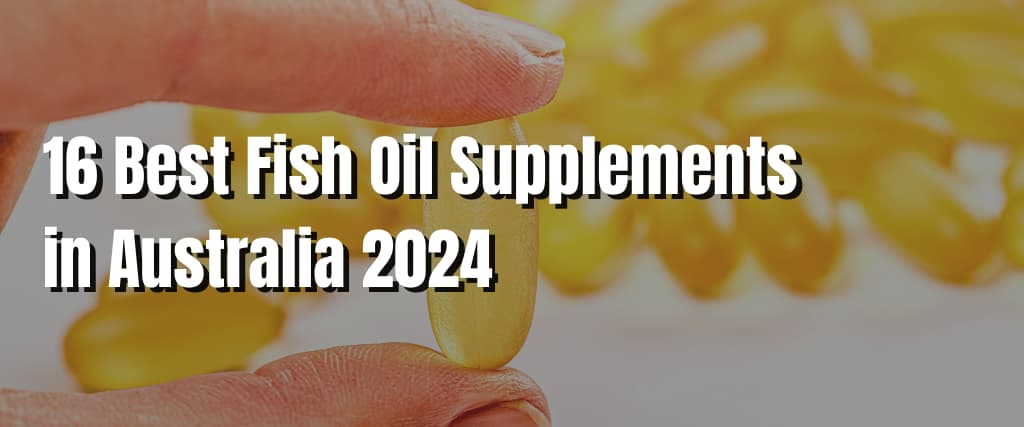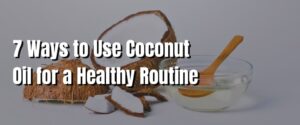Omega-3 fatty acids are polyunsaturated fats that improve inflammation response, cardiovascular health, immunity, and cognitive performance.
Omega-3 fatty acids come in three primary varieties:
EPA, or eicosapentaenoic acid.
DHA, or docosahexaenoic acid
ALA, or a-linolenic acid
They are available in two biologically active forms: DHA and EPA, primarily in fish. Plant meals contain ALA, which must be converted to EPA and DHA before being used by the body. Experts recommend supplementing fish oil to get enough omega-3 fatty acids into your diet if you don’t eat fish often.
However, the skyrocketing demand for fish oil supplements, especially in Australia, has led to a flood of products in the market. Finding the right product for your nutritional needs has made it challenging.
Luckily, experts have done the legwork and found Australia’s top fish oil supplements for 2023 to save you time and energy.
What are Fish Oil Supplements?
Fish is high in omega-3 fatty acids; EPA, eicosapentaenoic acid and DHA, docosahexaenoic acid. These two omega-3 fatty acids are the most crucial to obtaining from animals.
Fish oil is refined, removed from the tissues, and converted into a convenient liquid, tablet, or capsule for supplements.
While these products are crucial for a balanced diet, only some enjoy seafood. If seafood isn’t your thing, consider using fish oil pills as an easy and cost-effective substitute for fish.
Best Fish Oil Supplements in Australia
Numerous health benefits are associated with the omega-3 lipids found in fish oil.
Since omega-3s are anti-inflammatory, they may benefit many conditions, especially cardiovascular disease, linked to prolonged inflammation. Both EPA and DHA have been linked to reducing high triglyceride levels, another potential heart disease risk factor.
Furthermore, omega-3s are essential for the growth of the eyes and may aid in managing dry eye disease, so they play a crucial role in vision and eye health.
Brain health is another area where omega-3s shine. They are crucial in ensuring healthy brain growth during infancy and early childhood.
Omega-3 supplements in adults may help reduce the risk of stroke and dementia.
1. Nature’s Own
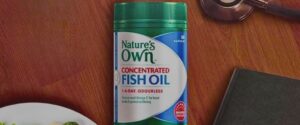
Benefits
Free of lactose, sugars, gluten, or dairy
There are no added flavours or dyes.
Tested for heavy metal and pesticide
Reasonable price
Downsides
Pregnancy and children are not mentioned.
Less effective than competing brand
Nature’s fish supplement is available, so you don’t have to worry about a fishy aftertaste. The business guarantees there will be almost no fishy odour. So there should be no need to worry about letting loose an oily belch!
The manufacturer also ensures the purity and freshness of the product by testing it for many pollutants, heavy metals, and pesticides, among other contaminants. The manufacturer also asserts that it can ease arthritis pain and promote healthy eyes and brains.
Many happy customers have reported that they have not experienced any gastrointestinal distress or belching after using this product. Furthermore, there is no recognisable odour of fish.
However, some customers have reported side effects like stomach issues, gas, diarrhea, and bloating. Furthermore, the manufacturer and customers alike caution against the large capsules.
2. Blackmores

Benefits
Free of Yeast, Milk Products, Wheat, or Other Contaminants Added
There are no artificial ingredients such as sugar, salt, or flavouring.
Thoroughly examined for the presence of mercury and other pollutants
Appropriate for kids (but check with a doctor first regarding dosage).
Downside
Pregnancy suitability is not mentioned.
Less potent than other brands
Blackmores contains 300 mg of top-rated omega-3 in each capsule, ensuring that your skin, eyes, heart, and brain get all the omega-3 they require.
Small, wild fish are used to produce their fish oil. Additionally, it is put through a unique extraction process to ensure its quality and longevity while simultaneously removing contaminants like dioxin, mercury, and PCBs.
The brand specifies that the product is suitable for usage by kids. Fish oil capsules can be opened and poured into food or drinks. Before deciding on a dosage, though, it’s best to talk to your doctor.
The famous Australian supplement brand has won over the heart of many satisfied customers. Users report no fishy aftertaste or odour, and the rectangular capsule’s smooth texture makes it simple to take.
Blackmores even offers a mini-cap version for the remaining users with trouble swallowing.
3. Ethical Nutrients
Benefits
Strong efficacy
Naturally occurring
Absence of all common allergens
Free of added colours or flavours.
Extensive analysis for the presence of pesticides and metals
Pregnancy-safe
Downsides
Not safe for kids
No complete list of ingredients
All of the EPA and DHA in Ethical Nutrients come from wild, tiny cold-water fish low in mercury.
This product undergoes stringent testing to guarantee it is free of contaminants like pesticides, lead, arsenic, mercury, and more. Also, the high concentration in each capsule means you can get your recommended daily allowance of omega-3 with no fishy aftertaste.
The manufacturer claims that this item aids in maintaining healthy eyes, heart, and nervous systems, as well as a normal, healthy pregnancy.
Many users appreciate its high potency allows them to take fewer tablets daily. In addition, it has been noted that the capsules are easy on the stomach in multiple customer evaluations. And many people can’t even detect a hint of fishiness.
4. Piping Rock
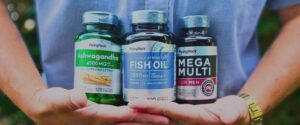
Benefit
Non-GMO
Free of gluten, wheat, soy, milk, yeast, or lactose
No flavour, artificial colour, or sweetener
Downsides
Not good for kids
It doesn’t guarantee pregnancy safety
Piping Rock is extracted from cold-water fish (sardine, anchovy, mackerel) and has been shown to support healthy joints, bones, energy levels, eyes, and hearts.
Many reviewers have commented that only taking one soft gel daily is helpful. Most people also don’t report unpleasant fishy burps or bad taste. Many customers think it’s a bargain for the price.
The capsules, though, could be cumbersome.
5. Wild Alaskan

Benefits
Renewable and sustainable (MSC-approved)
Sustainable
Absence of all common allergens
There is no sugar, artificial flavouring, or dyes used in production.
PCB-, cadmium-, mercury-, lead-, and arsenic-free
Downsides
Expensive
Not safe for children
It doesn’t mention its safety for pregnant women.
The purest wild pollock ever captured in US waters is used to make Wild Alaskan, manufactured in Alaska. Additionally, their fish oil is sourced from verified to meet the MSC’s international sustainability standard!
The greatest EPA/DHA concentration per capsule on the list is found in this product, as you may have noticed. They have used cutting-edge filtration and distillation techniques to concentrate the fish oil to obtain this high efficiency. You simply need to take a capsule daily as a result.
And customers gush about it! They don’t need to take as many pills every day thanks to the high omega-3 concentration. Most consumers also report that swallowing is not too difficult and do not notice any stomach problems. And they confirm that there is no taste or smell of fish in the capsules!
Some users of the product claim that it effectively decreased cholesterol levels and discomfort in their joints over extended periods of use.
On the other hand, many people have lamented the expensive pricing and horrible stomach issues. The soft gels may also be too big for some people.
6. Nordic Naturals
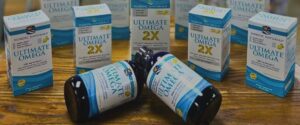
Benefits
Friend of the Sea-certified as sustainably supplied
Non-GMO
No artificial colours or flavours, milk derivatives, or gluten is present.
examined by a third party for environmental contaminants (like mercury)
tangy lemon flavour
Downsides
Not good for everyone
Friend of the Sea has verified that this product was made in a zero-waste plant using renewable energy.
Furthermore, an independent organisation has confirmed the safety and efficacy of this Ultimate Omega Lemonade. This guarantees that no dangerous chemicals or metals are present.
Several reviewers have cautioned about the oversized nature of the capsules, despite their relatively high EPA/DHA content. Some consumers also report experiencing fishy burps and odours after consuming the product.
Fish oil from small fish obtained in the wild, such as anchovies and sardines, is the most popular choice. Instead of a fishy aftertaste, they say a zesty, refreshing lemon flavour greets them.
The label boasts that medical professionals highly recommend this item. Their claim is supported by patients’ experiences who have tried the item at their doctor’s suggestion. Regular use benefits skin, joints, eyes, and heart health.
8. Swisse Ultiboost
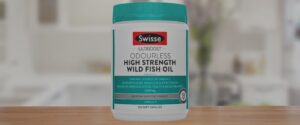
Benefits
No yeast, eggs, lactose, artificial colours or flavours are added.
Children can use pierced capsules (although you should check with your doctor beforehand).
Safe for pregnant women (but check with your doctor first).
Pocket-friendly
Downsides
Safety of pregnancy is not guaranteed
Swisse Ultiboost is a great way to increase your family’s consumption of omega-3 fatty acids, and it comes in convenient bulk packs. This includes young children and expectant mothers.
The capsules in this budget-friendly treatment don’t taste or smell foul, and that’s a big selling point. The fish oil used by the company comes from wild-caught Pacific Ocean fish. Omega-3 levels increase by up to 50% per capsule compared to the industry norm of 1000mg seen in most fish oil supplements.
Users have noted that the odourless capsules tend to be on the larger side, but the smooth coating makes them much more accessible. In addition, after using it for a few months, some people report feeling happier and having more energy.
9. Life Extension (Softgels)

Benefits
Five-star IFOS rating
Gluten-free and LE-certified non-GMO
Genuineness lemon flavour
Anchovies used to make fish oil are harvested responsibly.
Sesame lignans with olive polyphenols for enhanced benefits
Downsides
Not Good for kids
Safety for pregnant women is not assured
Less effective
Soft gel capsules made with olive extract and sesame lignans are the brand’s bread and butter. These increase the advantages of fish oil and have a favourable impact on your body’s metabolism.
Additionally, the item received a FIVE-star ranking from IFOS, an independent organisation that establishes criteria for the calibre of fish oil. You rest assured that each pill is pure, effective, and fresh. In addition, the lemon flavour masks the taste and smell of fish.
Many have noted that the product supports healthier skin and nails while reducing arthritic discomfort! Despite not looking like your typical fish oil supplements, the dark-coloured capsules are smaller than those from other brands.
In general, users are happy with the odourless pills, and most don’t have any post-use discomfort in their stomachs or fishy burps!
10. California Gold
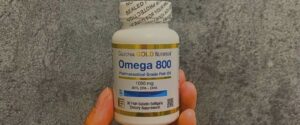
Benefits
purified by molecular distillation to eliminate impurities
Non-GMO
Produced without the use of any allergens
No wheat, soy, or gluten are used in production.
Downsides
This content is not kid-friendly.
The brand does not guarantee pregnancy safety.
Allergens such as wheat, nuts, and so on are processed in this facility.
less effective
The fish oil used in California Gold Nutrition has been molecularly extracted, and the manufacturing process follows stringent quality control guidelines. Environmental pollutants and toxins are also examined extensively.
Over 141,000 customers have given this product five stars on iHerb, indicating their satisfaction. Users report that despite the tablet’s large size, it is easily swallowed with just a sip of water.
Those using this supplement regularly for extended periods report feeling happier, having more energy, looking younger, being more mobile, and having more excellent hair and nails. Additionally, some people have reported improved cholesterol and acne levels after using it.
Unfortunately, not everyone enjoys these advantages. Since less EPA/DHA exists in each capsule, some people do not experience any benefits.
Others caution against potential adverse reactions, including nausea, vomiting, and diarrhoea. If your stomach is easily upset, it is recommended that you take this medication with food.
11. Triple Strength
Benefits
Non-GMO
IFOS five-star certified
MSC-certified (sustainability)
Great potency
Third-party quality approved for purity
Free of common allergens
Downsides
Not recommended for kids
No safety guarantee for pregnant women
The amount of EPA and DHA in each capsule of Triple Strength is impressive. It’s one of the most potent fish oil pills here. Furthermore, the MSC has verified that its fish oil comes from sustainable sources such as Alaska pollock.
This nutritional supplement, which has also received a perfect score from the IFOS, will help you get all the omega-3s you need daily.
Users are astounded by the high concentration of EPA/DHA in a single capsule, with no fishy flavour or odour. Aside from that, many people report no unpleasant tummy rumblings or fishy burps.
Those who have used the product claim that it has lifted their spirits, given them more energy, and enhanced the health of their hair, skin, and nails.
It’s difficult to find flaws with such a high-quality product, with the possible exception of the big size of the capsule. However, no one can grumble when one pill contains both EPA and DHA.
12. Carlson Labs Wild Supplement
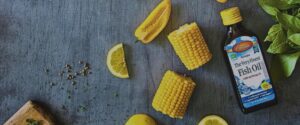
Benefits
Sustainable, wild-caught seafood
Purity confirmed by an outside FDA laboratory
Certified non-GMO by both IFOS and IGEN.
Free of gluten and any artificial additives
Downsides
No mention of child suitability.
Pregnancy suitability is not mentioned.
Carlson Labs Wild Gems is another product with an acceptable amount of DHA and EPA per capsule. The manufacturer claims the product is the purest and the most premium fish oil supplement in the market. Their cold-water, wild-caught fish are used to produce their fish oil in an eco-friendly way.
Furthermore, this product is regularly tested by FDA labs to ensure its purity! Thus, you can rest assured that Carlson Labs Wild Gems is at its peak of efficacy and freshness. It also lacks the potentially hazardous levels of 28 different pollutants other water supplies have.
Some consumers have found Carlson fish oil to be less gastrointestinally distressing than competing brands. Many customers love them because their capsules don’t taste bad or smell fishy. Some individuals also report that after only a few months of use, their hair has grown thicker and more robust they have a more positive outlook overall.
Some people have bad reactions after using it, such as a reaction to allergens or stomach discomfort. But besides that, many people think this product is excellent.
The Top Spending PlanTeam Omega: Barlean’s Buddies Slurping and Swirling Your Lemonade
13. Barlean’s Omega Lemonade
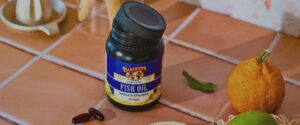
Benefits
Pocket-friendly
The finest infant DHA supplement is suitable for sensitive stomachs.
Good for infants
One and a half teaspoons of Barleans Omega contains 750 milligrammes of omega-3s (455 milligrammes EPA, 295 milligrammes DHA, and 185 milligrammes of additional omega-3 fatty acids). It has a consistency closer to a smoothie than an oil, so kids may eat it straight from the spoon or incorporate it into other foods like yoghurt, cereal, or applesauce.
Barleans prefer oil from little fish (like sardine and anchovy) since they contain significantly less mercury and other heavy metals. To further guarantee the quality, Barleans adheres to the NSF. Their “Look It Up” programme verifies that all their products have undergone independent testing.
Barleans does not include artificial flavours or colours; it is gluten- and dairy-free. It’s also available in citrusy, tangy, and straw-nana flavours that please your taste buds.
14. Oslomega
Benefits
unbiased testing
Pocket-Friendly
Form in triglycerides for best absorption
Downsides
Not recommended for kids
For children who have trouble swallowing liquid or edible fish oils, Oslomega soft gels are a perfect alternative. Children as young as four can take them, although they work best for older children who are used to taking medication orally.
This product’s triglyceride structure and extensive independent evaluation for purity and efficacy (such as for heavy metals) win high marks from most Australians. The natural strawberry flavour of the coating helps to cover up any fishy aftertaste, so it’s a safe bet that youngsters will eat it. Every soft gel meal has 165 milligrammes of EPA and 110 milligrammes of DHA.
15. Garden of Life
Benefits
Non-GMO, gluten-free, vegan, and kosher-approved
FOS certified
Downsides
Coconut and stevia.
DHA/EPA is somewhat lower.
It must be refrigerated after opening.
If you’re looking for a vegan supplement to help your child get enough omega-3s, Garden of Life’s product is your best bet. In just half a teaspoon’s worth (2.5 ml), this certified vegan add delivers omega-3 fatty acids (880 mg). If your kid needs more omega-3s from other foods, this is a substantial quantity to add to their diet.
Moreover, it’s non-GMO, gluten-free, vegan, and kosher-certified and confirmed. This product’s MCT (Medium Chain Triglycerides) comes from coconut, so while it does not contain dairy or soy, the available research does not support the health advantages of MCT oil for the general population research.
Flax and algae offer the omega-3s for the strawberry juice, which is flavoured with Stevia for improved taste.
16. SmartyPants Kids Formula

Benefits
Certified by NSF and Clean Label
Vitamin and fish oil supplements in one
Free of added sugar, artificial colours, flavours and common allergens.
Downsides
Users will need more omega-3 foods daily.
Choose the SmartyPants with added omega-3s if you want something to help your child’s mineral, vitamin, and fish oil needs. The 100 milligrams of omega-3s and the other 15 necessary elements (such as vitamins A, D, C, E, & K, zinc, choline, and B12) are in just four gummies.
This supplement has a smaller overall omega-3 content compared to others on this list. For your child to get the 900 milligrams of ALA a day is advised for kids aged between four to eight, you’ll need to include additional omega-3 sources in their diet. Your child may benefit from this if they enjoy eating fish but needs more omega-3s.
You may feel good about giving your kid SmartyPants because it has earned several certifications. SmartyPants products, including this supplement, are free of artificial sweeteners, colours, and flavours. They are also free of common allergens like soy, dairy, gluten, and eggs and have earned certifications from the National Sanitation Foundation and the Clean Label Project.
Are Fish Oil Supplements Good for Children?
Fish high in omega-3 fatty acids EPA and DHA, which have been found to have health benefits, include tuna, salmon, herring, mackerel, and sardines. You may be concerned about whether your children can get adequate plant-based omega-3s if they don’t consume fish.
Omega-3 fats are found in many foods, including canola oil, soy, flax, walnuts, and chia seeds. The omega-3 fatty acid (ALA) found in plant meals is not easily transformed into the more beneficial EPA and DHA forms.
As a result, consider giving your kid a DHA and EPA supplement or making sure they consume plenty of fatty fish regularly. Among the people who could gain from taking fish oil capsules are:
1. Children Who Don’t Like Eating Fish
According to Manaker, the unusual flavour of fish may take repeated exposure to get kids to like it. A simple way to get kids to eat more fish is to incorporate it into kid-friendly dishes like mac and cheese. Different fish oil supplements are options you can discuss with a doctor if they still need to eat fish regularly.
2. Children Suffering From ADHD
Although fish oil is not a cure for attention deficit hyperactivity disorder (ADHD), some studies have shown that children with ADHD often benefit from taking omega-3 fatty acids; from plants or fish. Consider conversing with a certified pediatrician if they have received this diagnosis.
3. Children Suffering From Asthma
Introducing your kid to omega-3s as early as when they are just six can be great for their health. Also, frequent ingestion of fish, say once a week, as the child develops has been demonstrated to be beneficial in reducing asthma symptoms. Although these studies focused on fish consumption, parents of kids with asthma who don’t eat fish frequently may want to talk to their pediatrician about taking a fish oil supplement.
4. Children With Mood Disorders
More and more research suggests that giving children struggling emotionally or behaviorally omega-3 fatty acid supplements may help them. Although this topic has been the subject of studies, they have been relatively small.
Dosage also varied widely between studies. There needs to be more studies done, especially on children. Additionally, if your kid has behavioural or emotional issues, it’s best to talk to a doctor about the benefits and risks of omega-3 supplements.
Groups of Kids Who Do Not Need Fish Oil Supplements
Those who enjoy fish once or twice weekly: According to the American Academy of Pediatrics, children who consume fatty fish twice weekly meet the omega-3 requirements for good growth. Fish, particularly oily coldwater sea fish such as salmon, are rich in omega-3 fatty acids. Experts say the DHA and EPA benefit eye, brain, and heart health.
1. Kids With Shellfish or Fish Allergies
Some allergic reactions are life-threatening. Consult a doctor about a suitable supplement for your kid if they are allergic to fish or shellfish.
2. Vegetarian or Vegan Kids
Your family may feel uncomfortable taking a supplement derived from fish if you are vegetarian. In this case, you should ensure your kid gets plenty of omega-3s. If you want more options to satisfy your kid’s needs, a vegan, plant-based supplement may be worth discussing with a healthcare professional.
3. Kids on Anticoagulant Medications
Drug interactions between omega-3 supplements and anticoagulants such as heparin, warfarin, and other relevant thrombin blockers have been reported. Talk to your kid’s doctor about drug interactions and bleeding complications risks if your child is on these medications.
How to Choose Supplements
You may learn more about the dietary supplement approach here, and be assured that experts make every effort to be as forthright as possible in their recommendations.
This post has only included supplements with solid scientific backing. In the opinion of experts, the most excellent quality items share a few common characteristics. Independent third-party certifiers (NSF, USP, or ConsumerLab) have also evaluated and approved the products.
You should also prioritise finding non-GMO, Organic, and made without extraneous or dangerous ingredients. A qualified dietician can also assist in discerning the quality of fish oil supplements.
Below are things you should look for when shopping for the best fish oil supplement:
1. Third-Party Testing
Third-party tested supplements are examined in a laboratory to verify they are free of common but dangerous impurities. These tests ensure that the products contain only the ingredients they claim to have. Nonetheless, bear in mind the following:
The effectiveness and safety of a product may vary from person to person, and third-party testing cannot guarantee that a supplement won’t interact negatively with pharmaceuticals or other supplements.
Third-party testing has a wide range of quality. It is typical practice for supplement manufacturers to pay labs for certifications even though minimal testing is often performed.
NSF, ConsumerLab, and USP are credible third-party certifications you can rely on. Many businesses need to avoid getting their products examined by one of these three groups since certification is either difficult to achieve or very expensive.
The cost of certification by one of these three organisations is sometimes passed on to consumers as a slight price increase for the product.
A supplement’s lack of approval from any of these three labs is not indicative of its quality. You should look into the company’s history and phone the production facility and testing centre to ask about their procedures before deciding whether or not to take the supplement.
POPs (persistent organic pollutants) are fish and fish oil toxins. Toxic chemicals have the potential to cause harm to human beings. They are carried by wind and water, making them difficult to contain.
Toxic substances, including PCBs (polychlorinated biphenyls) and OCs (organochlorine pesticides), can enter the human body by ingesting fish oil supplements. Mainly, PCBs have been linked to endocrine and cognitive disruption in children.
Small amounts of mercury can also be found in all fish. However, the concentration varies greatly among fish species. In humans, mercury exposure can be poisonous and lead to permanent nerve damage. For this reason, the U.S. FDA recommends that nursing mothers, pregnant women, and kids eat fish no more than twice a week.
There are several methods producers can use to guarantee quality standards are upheld and reduce any health concerns linked with fish and fish oil supplements. Choosing a supplement for your child that has undergone third-party testing for toxins and heavy metals is crucial.
You should also check that the manufacturer you pick employs ethical practices when purchasing their fish to guarantee that it comes from a sustainable source.
2. Form
There are three distinct forms of omega-3 acids can exist:
eicosapentaenoic acid, or EPA
docosahexaenoic acid, or DHA
alpha-linolenic acid, or ALA
Fatty fish like salmon, tuna, herring, sardines, mackerel, and certain algae are good sources of marine omega-3s (EPA & DHA). Walnuts, canola oil, soy, flax, and chia seeds are all good plant sources of ALA.
To determine the quality of an omega-3 supplement, check the label for the presence of DHA and EPA. Free fatty acids, phospholipids, triglycerides, and reformed triglycerides are all types of fish oil. Studies have shown that the ethyl ester variety is not as effectively absorbed as others; hence, selecting a different form is suggested.
3. Ingredients and Potential Interactions
If you want to know what’s in a supplement and whether or not it contains enough of a particular ingredient to meet your daily needs, you need to check the label. If you’re concerned about possible drug or supplement interactions for your child, bring in the supplement’s packaging so your doctor can review the complete list of contents.
Supplements containing fish oil are widely accepted as safe. Some people who take fish oil report unpleasant side effects, such as an unpleasant fishy aftertaste, indigestion, nausea, rash, and loose stools. As was previously noted, if your child has a fish or shellfish allergy, you should consult a healthcare expert before giving them a supplement derived from fish.
Some manufacturers use sugar alcohols as a sweetener in their dietary supplements. These may improve the supplement’s taste but also cause stomach upset.
Anticoagulant medicines can react with omega-3 fatty acid supplements. Talk to your child’s doctor about the risks of adding this to their current prescription regimen.
4. Fish Oil Dosage for Kids
Every week, kids should eat about four to six ounces of fish. However, most kids need to meet the minimum requirements. Consider giving your kids an omega-3 supplement to help them reach the recommendations because getting them healthy is challenging.
If you want to give a kid a supplement, you should consult a doctor first to be sure it will help and to get advice on the proper dosage.
Except for ALA, EPA & DHA recommendations have not been defined by experts. Experts have established ALA intake guidelines that apply across the lifespan and to both sexes.
5. Pricing
It’s possible to get cheaper brands of omega-3 fatty acids, but the amount of EPA/DHA in each capsule will be much lower. Therefore, you should increase your daily dosage of capsules.
6. Source
Pick a brand that cares about the future of the fishery. Smaller fish like anchovy may be more environmentally friendly and cleaner than larger fish like salmon. To ensure an item is sustainably sourced, look for certifications from groups like the Friend of the Sea or MSC.
7. Formulation
Supplements with fish oil can be found in liquid, tablet, or capsule form. Although capsules and tablets are more portable and convenient to use, liquid options are simpler to take in.
How Much of Fish Oil Supplement is Too Much?
The maximum daily intake of EPA and DHA from nutritional supplements for adults is 5 grams, as recommended by the experts. Unfortunately, no maximum safe omega-3 fatty acid supplementation dose has been determined for children.
Unpleasant side effects include stomach upset, bad breath, diarrhea, a fishy odour, nausea, and headaches. Dosing for children should only include what is recommended for their age range on the product’s label. Consultation with a pediatrician can help you determine whether or not your child requires a supplement and, if so, what dosage is appropriate.
Omega-3s may raise blood clotting times. Consult your doctor before beginning a supplement regimen if you have a history of bleeding disorders or are taking anticoagulant medication.
FAQ
How much fish oil should I take?
There is no firm suggestion regarding how much fish oil should be consumed daily. It is recommended that most adults take between 250 and 500 milligrams of mixed EPA and DHA each day. On the other hand, this dosage might need to be adjusted for kids and pregnant women.
What are prescription omega-3 drugs?
Omega-3 medications available by prescription include even higher amounts of the nutrient to treat various medical issues, including excessive cholesterol. If your doctor determines you have an increased risk of cardiac disorders such as heart attacks, they may recommend taking them.
When should I take fish oil supplements?
Be consistent! Using fish oil supplements regularly is the best way to experience their benefits. Therefore, take fish oil supplements while eating. Doing so may improve absorption and lessen the possibility of unwanted consequences like acid reflux.
If you are suffering from a sensitive stomach, taking your fish oil dosage throughout two or three separate daily doses is more manageable.
What are the main benefits of fish oil to the body?
According to research, supplementing with fish oil could lower blood pressure, bad cholesterol, and triglyceride levels and raise good cholesterol. In addition, fish oil capsules may lessen the discomfort of arthritic joints by reducing inflammation.
Some research also indicates that taking fish oil supplements can positively affect your hair, skin, and nails.
Additional research is required to confirm these advantages, though. OA sufficient body of research also does not support over-the-counter the-counter fish oil supplements to prevent cardiovascular research. In the meantime, you should treat everything with some caution.
High-risk individuals are more likely to benefit from preventative treatment for cardiovascular disease if they take prescription-strength doses rather than over-the-counter remedies.
Do I need fish oil supplements?
Eating fish is the most excellent method to get the omega-3 fatty acids you need.
Fish, especially fatty fish, is recommended at least twice weekly by health experts for all people. Fish high in omega-3 fatty acids, such as herring, sardines, mackerel, tuna, and salmon, can reduce the risk of cardiovascular disease.
Therefore, fish oil supplements are pointless if you eat the suggested fish quantity every week. If you don’t consume fish, fish oil supplements are a simple and inexpensive way to get more omega-3s into your diet.
What side effects can I experience after using fish oil supplements?
After ingesting fish oil products, individuals may experience adverse reactions like acid reflux, stomach pain, nausea, and loose stools. Your risk of adverse effects can increase if you take too much fish oil.
In addition, before beginning any supplement, pregnant women, children, and nursing mothers should always speak with their healthcare physician.
Fish oil supplements might not suit you if you have serious health issues or take any drugs, particularly blood thinners. Before beginning, get guidance from your doctor.
Finally, fish oil products have the potential to oxidise and turn rancid, producing an offensive odour. Throw away your fish oil pills if they strongly smell or taste fishy or rotten.
It is essential to take omega-3 oil supplements under the daily dosages advised by the manufacturer or, even better, by your healthcare provider.
What is cod liver oil?
Codfishes, especially Atlantic and Pacific cod, are the most prevalent sources of livers used to make cod liver oil.
High levels of omega-3 fatty acids can be found in cod liver oil and fish oil, but cod liver oil also has vitamins A and D. Because of this, they are believed to possess potent antioxidant and anti-inflammatory effects.
Can fish oil make me lose or gain weight?
Neither of these weight-related hypotheses has been supported by research. When taken within the prescribed dose range, fish oil hasn’t been demonstrated to have any adverse effects associated with weight gain. Neither has it been associated with reducing weight.
Additionally, tests have shown that fish oil has no adverse effects on weight gain.
What are the options for vegetarians and vegans?
If you’re vegan or vegetarian, plant-based sources can help you meet your omega-3 needs. These include algal oil, flaxseeds, Brussels sprouts, walnuts, and chia seeds.
These are a good source of ALA, a vital omega-3 fatty acid that can only be obtained from plants.
Is fish oil healthy for kids?
The two primary omega-3 fatty acids in fish are DHA and EPA, which are involved in several bodily processes, including muscular contraction, brain development, cell growth, and cognitive function.
To meet your child’s nutritional needs and support their growth, include fatty fish, such as mackerel, salmon, and sardines, which are high in DHA and EPA, in their diet. If this is not feasible, a fish oil supplement can offer many of the same advantages.
How do I make fish oil taste good for kids?
Children and teenagers who can swallow a soft gel shouldn’t have any trouble with the flavour. Keeping the capsule in the fridge or freezer can help reduce the sensation of fish if they are experiencing an uncomfortable taste. Since refrigeration is often required to maintain the freshness of the fish oil inside the capsules, this is a win-win situation.
Our top selections for kids who aren’t old enough for soft gels are liquids or gummies, and they’re renowned for offering tasty flavours that kids will enjoy consuming.
If your youngster has trouble swallowing liquid fish oil, try diluting it with a smoothie, yoghurt, or applesauce. Give them the vitamin on a spoon and have them wash it down using some liquid to get rid of the fishy taste.
Final Verdict
There are several considerations when choosing the fish oil product best suited to your needs. Ensure you don’t overdo it with them, either. That adage about “the more, the merrier” is false here!
Also, remember that what works for them may not work for you, and vice versa. There is an increased chance of undesirable side effects when using products with fish oil. Your primary care doctor or another licensed medical practitioner should be your first point of contact for any health-related concerns or questions.

